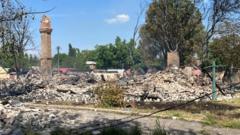Ukraine's Foreign Minister Andrii Sybiha has publicly accused Russia of delaying peace negotiations due to the lack of provided documentation regarding its peace terms.
Ukraine Accuses Russia of Delaying Peace Talks Amid Ongoing Conflict

Ukraine Accuses Russia of Delaying Peace Talks Amid Ongoing Conflict
As peace negotiations loom, tensions rise over stalled discussions between Kyiv and Moscow.
Ukraine, May 30, 2025 – In a recent press conference held in Kyiv, Foreign Minister Andrii Sybiha expressed concerns regarding the pace of peace talks with Russia, asserting that Moscow has yet to share a promised memorandum outlining its proposed peace terms. This document is essential for Ukraine to prepare an effective delegation for a scheduled round of discussions in Istanbul, planned for Monday.
Sybiha emphasized that for any encounter to be “substantive and meaningful,” Ukraine requires the memorandum beforehand, enabling their delegation to be empowered to negotiate effectively. The urgency of the situation is underscored by both nations' strategic moves to influence the terms and timeline of the negotiations, especially as the U.S. administration considers withdrawing from the discussions.
Kyiv's primary objective remains securing an immediate ceasefire, which Russia appears reluctant to endorse. Instead, Moscow emphasizes addressing what they describe as the “root causes” of the conflict, a reference to broader demands like halting NATO's eastward expansion—an approach that Ukraine views as an attempt to undermine its sovereignty.
During previous negotiations in Istanbul earlier this month, both sides had reportedly consented to present their peace terms; however, talks yielded minimal outcomes, featuring primarily a significant prisoner exchange. Ukraine claims to have submitted its peace terms to both Russia and the United States ahead of the upcoming meetings, while Russia has indicated that their memorandum will only be presented during the new round of discussions, leading to Ukraine's accusations of deliberately stalling the peace process.
Sybiha emphasized that for any encounter to be “substantive and meaningful,” Ukraine requires the memorandum beforehand, enabling their delegation to be empowered to negotiate effectively. The urgency of the situation is underscored by both nations' strategic moves to influence the terms and timeline of the negotiations, especially as the U.S. administration considers withdrawing from the discussions.
Kyiv's primary objective remains securing an immediate ceasefire, which Russia appears reluctant to endorse. Instead, Moscow emphasizes addressing what they describe as the “root causes” of the conflict, a reference to broader demands like halting NATO's eastward expansion—an approach that Ukraine views as an attempt to undermine its sovereignty.
During previous negotiations in Istanbul earlier this month, both sides had reportedly consented to present their peace terms; however, talks yielded minimal outcomes, featuring primarily a significant prisoner exchange. Ukraine claims to have submitted its peace terms to both Russia and the United States ahead of the upcoming meetings, while Russia has indicated that their memorandum will only be presented during the new round of discussions, leading to Ukraine's accusations of deliberately stalling the peace process.




















